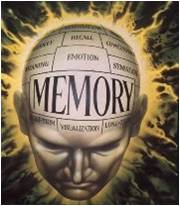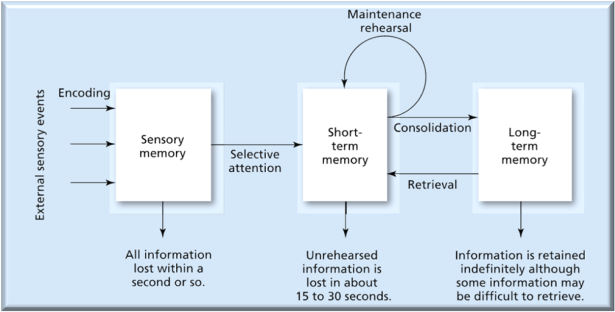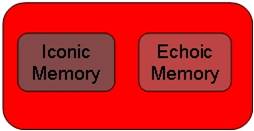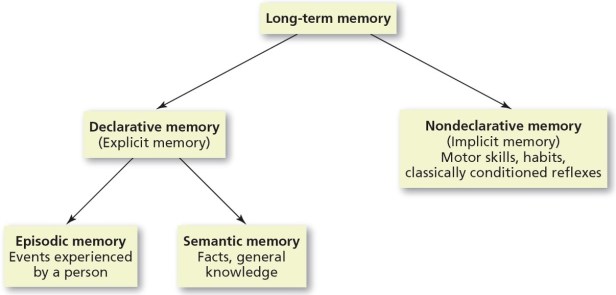Memory and Processes
Memory: An active system that receives information from the senses, organizes and alters it as it stores it away, and then retrieves the information from storage

Processes of Memory:
- Encoding – the set of mental operations that people perform on sensory information to convert that information into a form that is usable in the brain’s storage systems
- Storage – holding onto information for some period of time
- Retrieval – getting information that is in storage into a form that can be used

Models of Memory:
- Information-Processing Model – model of memory that assumes the processing of information for memory storage similar to the way a computer processes memory in a series of three stages

- Levels-of-Processing Model: Model of memory that assumes information that is more “deeply processed,” or processed according to its meaning rather than just the sound or physical characteristics of the word or words, will be remembered more efficiently and for a longer period of time.


- Parallel Distributed Processing (PDP) Model: A model of memory in which memory processes are proposed to take place at the same time over a large network of neural connections.

THREE STAGES OF MEMORY:
- Sensory
- Short Term Memory
- Long Term Memory
SENSORY MEMORY:

- Sensory Memory: The very first stage of memory, the point at which information enters the nervous system through the sensory systems
- Iconic Memory: Visual sensory memory, lasting only a fraction of a second
- Capacity: Everything that can be seen at one time
- Duration: Information that has just entered iconic memory will be pushed out very quickly by new information, a process called masking except for Eidetic Imagery, the rare ability to access a visual memory for 30 seconds or more
- Echoic Memory: The brief memory of something a person has just heard
- Capacity: Limited to what can be heard at any one moment and is smaller than the capacity of iconic memory
- Duration: Lasts longer that iconic — about 2 to 4 seconds

- Short-term memory (STM) (working memory): The memory system in which information is held for brief periods of time while being used
- Digit-Span test: Is a memory test in which a series of numbers is read to subjects in the experiment who are then asked to recall the numbers in order. Conclusions are that the capacity of STM is about seven items or pieces of information, plus or minus two items, or from five to nine bits of information, “Magical Number” = 7
ENHANCING SHORT TERM MEMORY:
- Maintenance rehearsal: practice of saying information to be remembered over and over in one’s head in order to maintain it in short-term memory (STMs tend to be encoded in auditory form) Without rehearsal duration of STM is about 12 to 30 seconds
- STM is susceptible to interference, (e.g., if counting is interrupted, have to start over)
- Long-Term Memory (LTM): The system of memory that information is placed to be kept permanently
ENHANCING LONG TERM MEMORY:
- Elaborative Rehearsal: A method of transferring information from STM into LTM by making that information meaningful in some way.
TYPES OF LONG TERM MEMORY:
- Procedural (Non-Declarative) Memory – Type of long-term memory including memory for skills, procedures, habits, and conditioned responses. These memories are not conscious but are implied to exist because they affect conscious behavior
- Declarative Memory – type of long-term memory containing information that is conscious and known (memory for facts)
- Semantic Memory – type of declarative memory containing general knowledge, such as knowledge of language and information learned in formal education
- Episodic Memory – type of declarative memory containing personal information not readily available to others, such as daily activities and events
- Semantic and Episodic memories are forms of explicit memory – memory that is consciously known
All the things that people know!!
- Automatic Encoding: Tendency of certain kinds of information to enter long-term memory with little or no effortful encoding
- Flashbulb Memories: Type of automatic encoding that occurs because an unexpected event has strong emotional associations for the person remembering it

AMNESIA:
- Retrograde Amnesia: Loss of memory from the point of some injury or trauma backwards, or loss of memory for the past
- Anterograde Amnesia: Loss of memory from the point of injury or trauma forward, or the inability to form new long-term memories (“senile dementia”)
- Infantile Amnesia: The inability to retrieve memories from much before age 3.
ALZHEIMER’S:
- The primary memory difficulty in Alzheimer’s is anterograde amnesia, although retrograde amnesia can also occur as the disease progresses.
- There are various drugs in use or in development for use in slowing or stopping the progression of Alzheimer’s disease.
Memory Retrieval Problems:
- Decay: Loss of memory due to the passage of time, during which the memory trace is not used
- Misinformation Effect: The tendency of misleading information presented after an event to alter the memories of the event itself
- Forgetting: Interference Theory
- Proactive Interference: Memory retrieval problem that occurs when older information prevents or interferes with the retrieval of newer information (Driving in England)
- Retroactive Interference: Memory retrieval problem that occurs when newer information prevents or interferes with the retrieval of older informationFalse Memory Syndrome: The creation of inaccurate or false memories through the suggestion of others, often while the person is under hypnosisEvidence suggests that false memories cannot be created for just any kind of memory
- The memories must at least be plausible
- Recognition: The ability to match a piece of information or a stimulus to a stored image or fact
- False positive: Error of recognition in which people think that they recognize some stimulus that is not actually in memory
References:
Bernstein, D.A. & Nash, P.W. (2008). Essentials of psychology (4th ed.) Boston: Houghton Mifflin Company.
Feldman, R. (2013). Essentials of understanding psychology (11th ed.). New York, NY: McGraw-Hill.
Friedman, H.S. & Schustack, M.W. (2012), Personality: classic theories and modern research (5th ed). Boston: Pearson Allyn & Bacon.
McGraw-Hill.McGraw Hill Higher Education (2013), The McGraw Hill Companies, Inc.
Ryckman, R. M. (2013). Theories of personality (10th ed.). Mason, OH: Cengage Learning.


Read and understood in class
LikeLike
Read and understood in class
LikeLike
I read it it usually makes more sense when you explain it we went over it last week .
LikeLiked by 1 person
Read and understood .
LikeLike
read and understand
but its weird for me to know that I can not retrieve all the memories
LikeLike
read and understood
LikeLike
Read and relatively understood
LikeLiked by 1 person
read and somewhat understood
LikeLiked by 1 person
I read and was a bit confused.
LikeLiked by 1 person
Read and understood
LikeLike
I read this and took note of the vocabulary for both short and long term memory. The videos helped a lot with explaining how things work and what sensory’s aid with remembering.
LikeLiked by 1 person
Read and partly understood, and it is fascinating to see the different aspects of each stage of memory.
LikeLike
I read it however there were a lot of terms on it and i was wondering if we need to memorize every model, and types of short and long term memory.
LikeLike
Read and Understood.
LikeLike
Professor as I mentioned to you in class I did read but forgot to post it here.
LikeLiked by 1 person
Read and understood
LikeLike
read and understood
LikeLike
Read, found it interesting
LikeLiked by 1 person
read/watched but didn’t understand all the terms are confusing and need to be broken down a little bit more
LikeLiked by 1 person
Read, but slightly confused on the topic — maybe going over this in class will help clarify.
LikeLike
read and confused but also understood a little
LikeLike
Read but very confused
LikeLiked by 1 person
read but very confused
LikeLiked by 1 person
read and confused about the Levels-of-Processing Model and also wondering if most people have infantile amnesia?
LikeLiked by 1 person
read but still a bit confusing
LikeLiked by 1 person
read and understand more because you explain in class last week
LikeLike
Read it & a little confused on the different types of memory
LikeLiked by 1 person
I get confuse on models of memory??? Read and understand the rest!!!!!!
LikeLike
I didn’t get about the Memory Retrieval problem
LikeLiked by 1 person
Read and understand
LikeLike